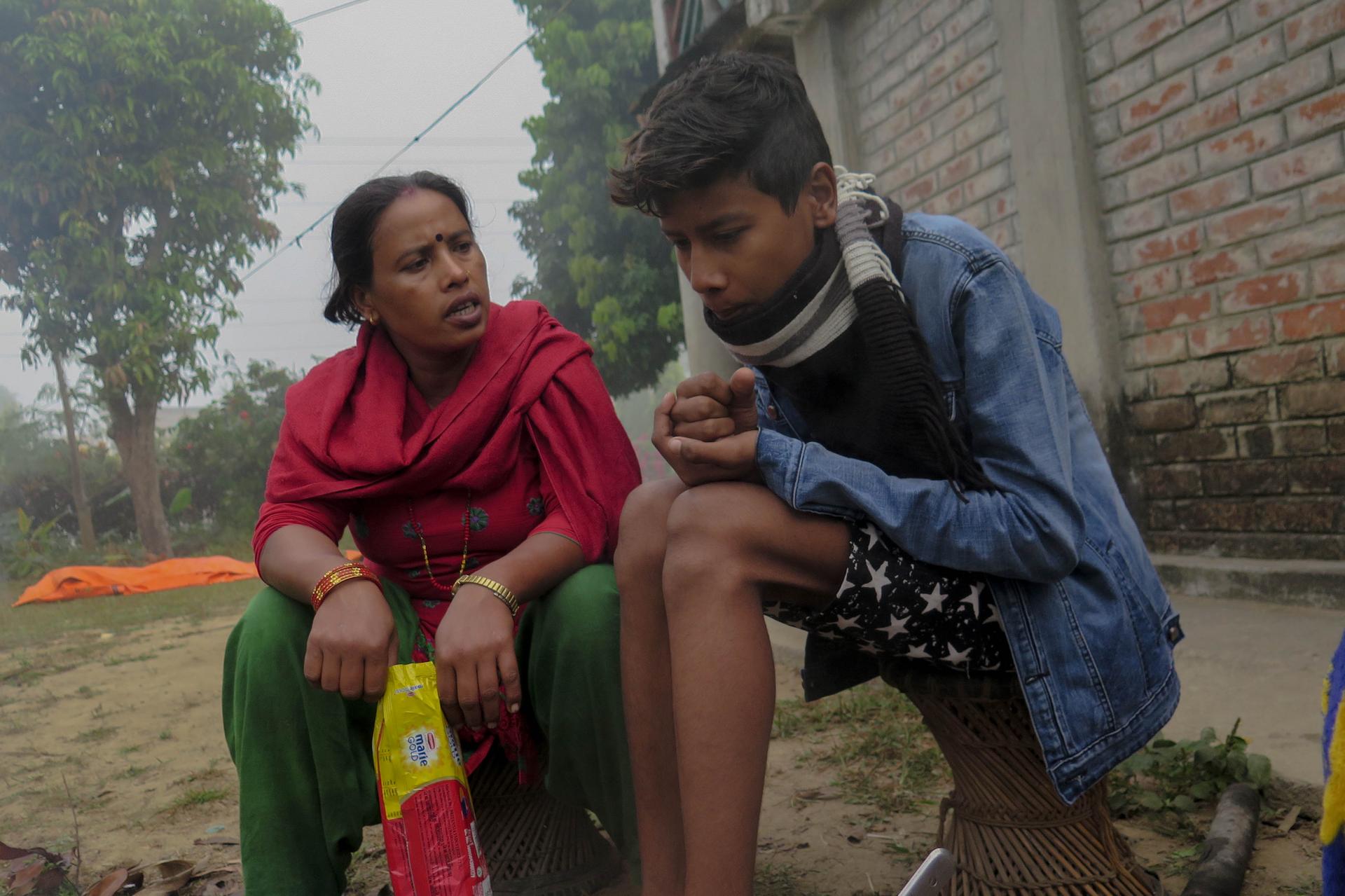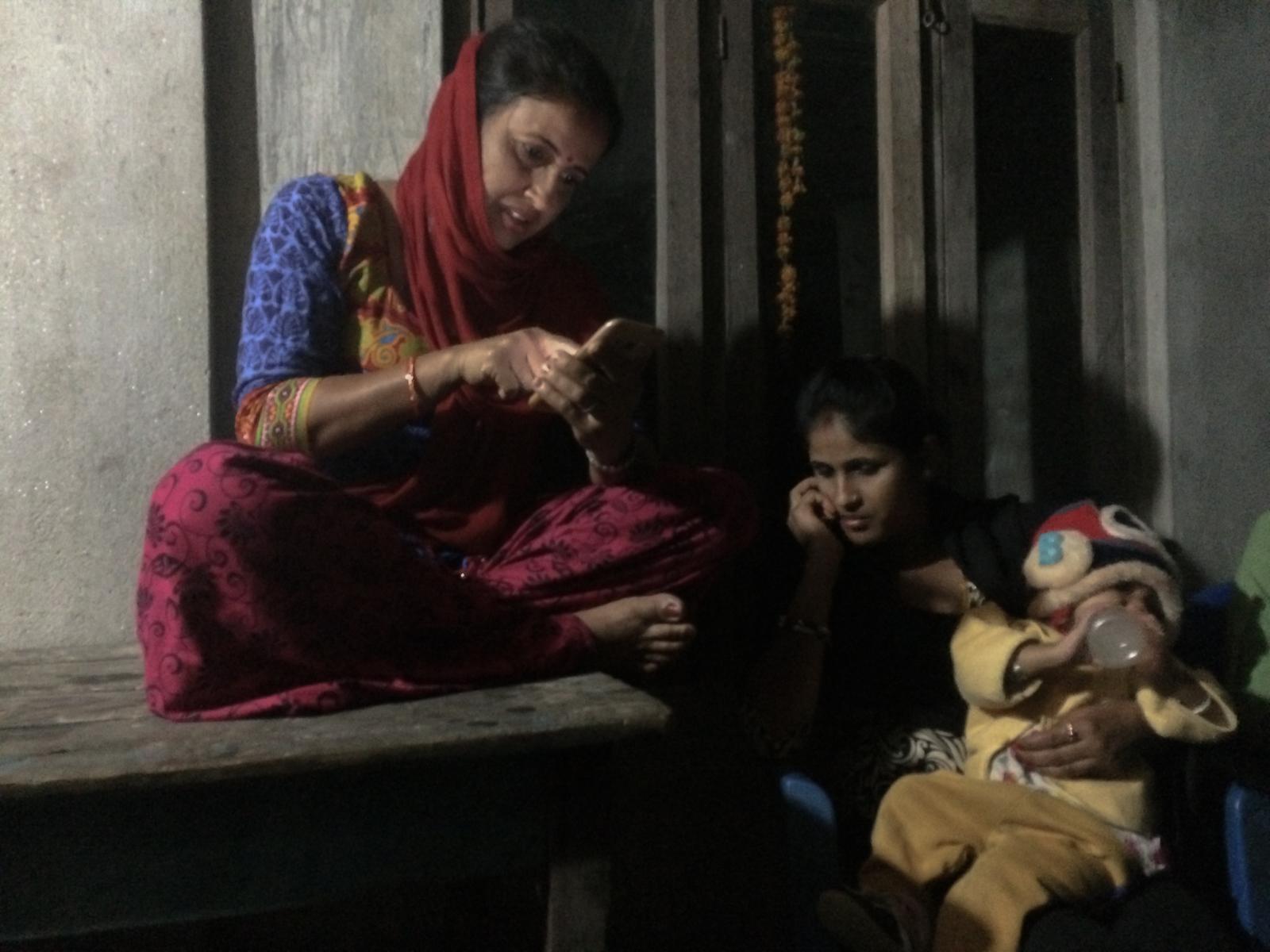A world without men? When men go abroad to work, women in Nepal take the lead at home.
After teasing her neighbors for spending too much time on their phones, Nirmala Guragain checks out her sister's iPhone, as she dozes nearby with her son.
Night has fallen inky black and cold over Amar Basti village, but Kalpana Thapa and her neighbors are loath to drift off to bed. They punch at their phones, pull shawls tighter and coo at the children careening around. A light bulb, powered by a shared electricity line, illuminates the concrete platform that serves as Thapa’s dining room.
None of this — not the concrete, lights, smartphones or even the women chatting amicably with strangers — would have been imaginable 20 years ago.
“Women couldn’t even say their name back then,” says Thapa, 37, a half-smile playing across her lips. Her hair is pulled back, and faint lines stretch from her eyes. “Even in a women’s group they couldn’t stand up and speak their name [because] they were so shy. … Now at meetings, women outnumber men.”
To Thapa, the reason is clear: As more and more men leave Amar Basti, “the women are more active.”
With men working abroad, Nepal's communities are giving women power they never had before — though at a cost. Today, women seem to run Amar Basti — a small village of about 100 households — in eastern Nepal’s Jhapa district.

Thapa’s husband has worked in Qatar for the past 18 years. Next to her sits Nirmala Guragain, whose husband Shiva has worked in Malaysia, Bahrain and Qatar on and off since 1998 and hopes to soon find a job in the United Arab Emirates.
Guragain’s sister, Mira, whose husband is also abroad, runs after her toddler. When the boy gets fussy, Mira presses her cellphone to his chubby cheek and tells him: “it’s for you.”
“Daddy?” he replies.
Each day, thousands of Nepalis migrate. Working abroad can be risky, even fatal, but for the approximately 3 million Nepalese employed overseas it represents a singular shot at a better life for them and their families. Today, nearly 32 percent of the Nepal’s GDP comes from remittances — the highest rate in the world — up from a mere 2 percent in 2000. Remittances are money sent by a foreign worker back into his or her home country. That figure translates to more than $6 billion a year, much-needed money for a nation with virtually no homegrown industry.
Pumped into small villages like Amar Basti, where residents relied solely on sustenance agriculture, the money has been transformative. After initial fees are paid to the labor broker, remittances send children to school, purchase land and build houses.
While an increasing number of migrant workers are women, the vast majority are men — many with wives and children. The phenomenon has become so common that young men in high-migration areas like Amar Basti find it difficult to find a wife if they don’t go abroad. Despite the loneliness, despite the potential clashes with in-laws and neighbors, it can be better for women to have husbands who live far away than ones who simply cannot provide.
With so many absent men in some areas of Nepal, the role of women has shifted dramatically.
Traditionally, women leave their home villages upon marriage and move in with their in-laws. The men make most financial decisions, run the farms, hire laborers. With their husbands gone, however, women in places like Amar Basti have had no choice but to take on these roles. They handle the farms, manage the books and make key decisions around finance, schooling and even living. Indeed, after schooling, one of the first things remittances often buy is a home away from the in-laws — a crucial measure of autonomy for many women.
“When men migrate, women are forced to take on so many of those roles that the husbands were doing,” pointed out Amina Maharjan, a livelihood specialist at the International Centre for Integrated Mountain Development, who has studied whether women benefit from male migration.
Maharjan recalled attending a conference a few years ago in which male participants were complaining that “migration is leading to the disintegration of families, of values, of manners. Everybody was complaining.”
In the local agriculture investment group here, 16 out of 20 board members are women. Traditionally barred from participating in funeral rites at all, women now often lead the sacred rituals, according to Thapa.
“It used to be women weren’t even allowed to perform these rituals. But now we have to because there are no men and you need one person per household,” she explained. “Women like me who have husbands abroad have to take charge of everything.”
In Amar Basti, mass migration has altered the area both physically and socially. Forty years ago, this speck of a village at the southeast corner of Nepal was forestland. The houses were made of mud and thatch and wood, the roads were little more than rutted trailways. And then, in the 1990s, labor migration to the Gulf States began in earnest and everything changed rapidly.
Now Amar Basti is neatly manicured, dotted with concrete homes, electric lines and motorcycles. The village’s pride and joy is a bright pink entry gate spanning the road, paid for by a group of men working abroad. In one way or another, nearly everything in Amar Basti is paid for by men working abroad.
Such improvements come at a steep cost. The work can be risky and exploitative. Stories of middlemen taking money and vanishing are not uncommon, nor are tales of bosses absconding with salaries. Migrant workers have been beaten on the job, blocked from coming home, arrested and even killed — situations so common they make the local news nearly every day. In June, Amnesty International released a report detailing widespread abuses within the recruitment process. Just last week, the latest US Trafficking in Persons report highlighted the attendant dangers of forced labor, trafficking, and fraudulent recruitment. Even in the best-case scenario, meanwhile, those who go away are still forced to miss years, or even decades of their children’s lives.
Overseas workers typically return every two to three years, at the end of their contracts. While working-age men are hardly a scarce sight in Amar Basti, there is often a sense of impermanence to their presence. Except for a handful of husbands trying to build up businesses at home, men in the village intend to return abroad. There is simply no way to get by otherwise.
“I want him to work abroad for a few years because our son is small and we need to support him,” Guragain said of her husband Shiva. If Shiva stayed and tried to work as an electrician near home, he would make about $200 a month. Abroad, he can send home double that amount.
A tall 30-year-old with an easy laugh, Guragain keeps her adored 6-year-old close by at all times. She fears what the future may bring for him.
“Now we are investing so much in their education, but there aren’t many jobs here. I feel like they might have to go to the same situation,” she says.
In Thapa’s case, the remittances have changed her family’s prospects. They invested the money in a plot of land, in their home, and in the education of their 16-year-old son, Dipesh.
Thapa hopes — desperately — that Dipesh won’t take his hard-won education and leave Nepal in search of work elsewhere. Dipesh, meanwhile, is happy to keep his options open. With any luck, though, he will finish his training to become a lab technician in a few years, and his father will be able to return home.
Until then, Thapa will be the head of the family, the decision maker, the entrepreneur. Each night, she’ll fall asleep alone with the sound of the television blaring to forestall loneliness.
This story was supported by the International Reporting Project.
Abby Seiff is a southeast Asia-based contributing reporter for The Fuller Project for International Reporting. Pragati Shahi is a senior environment writer with Onwardnepal. Her work has appeared at The Atlantic, Time, Broadly, UCA News and Kathmandu Post.
